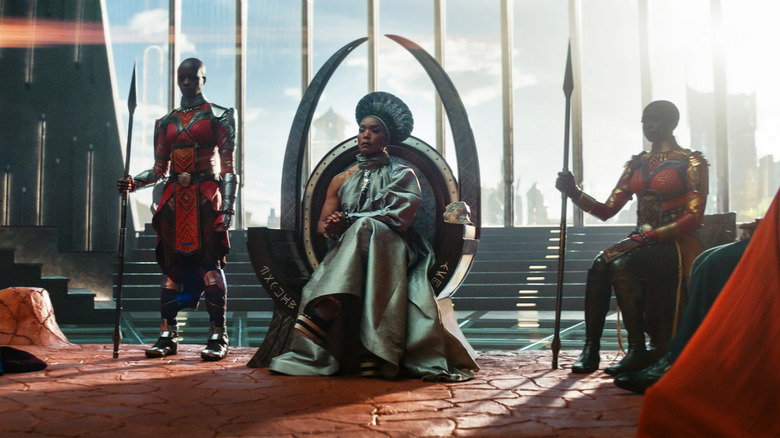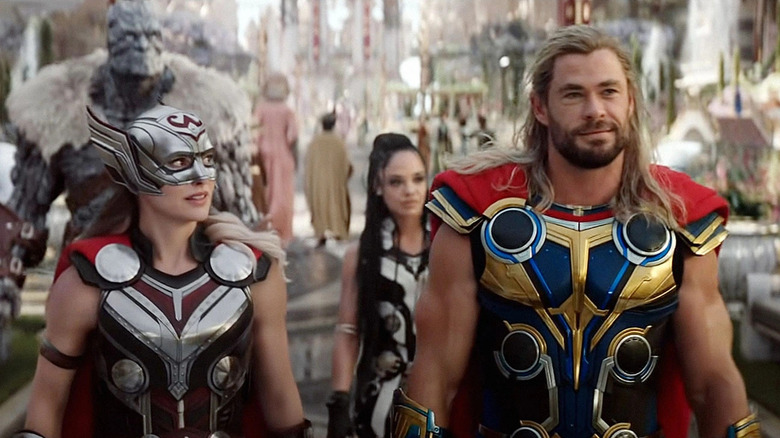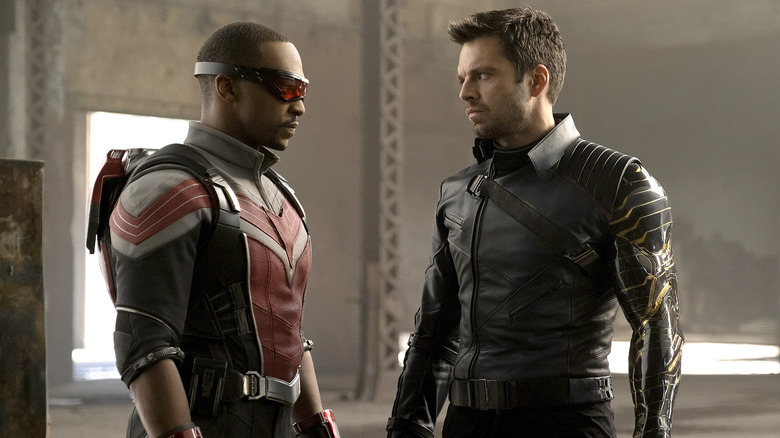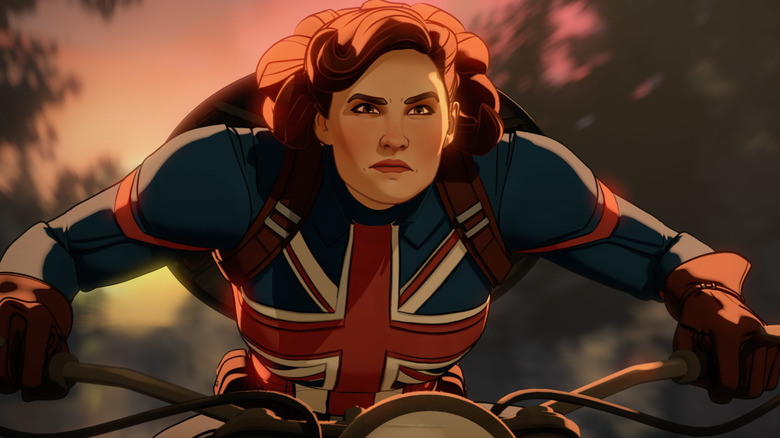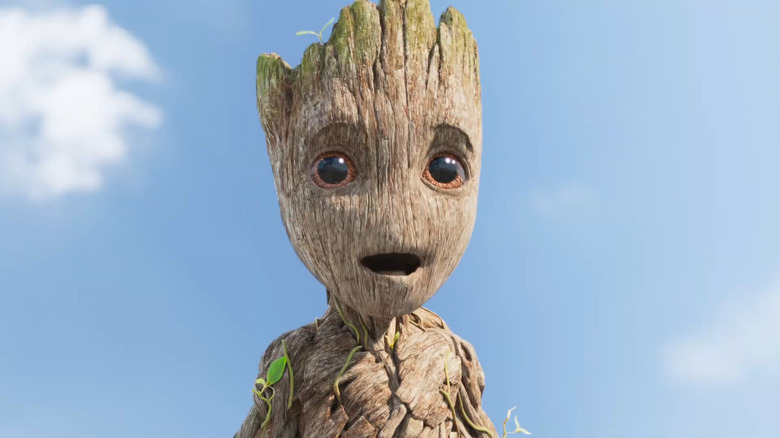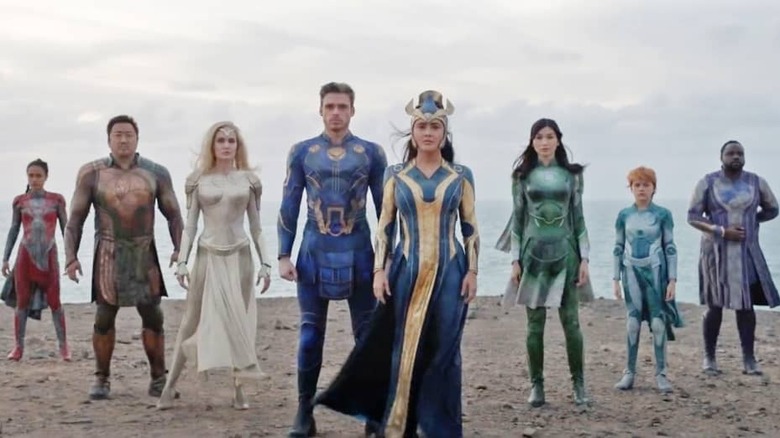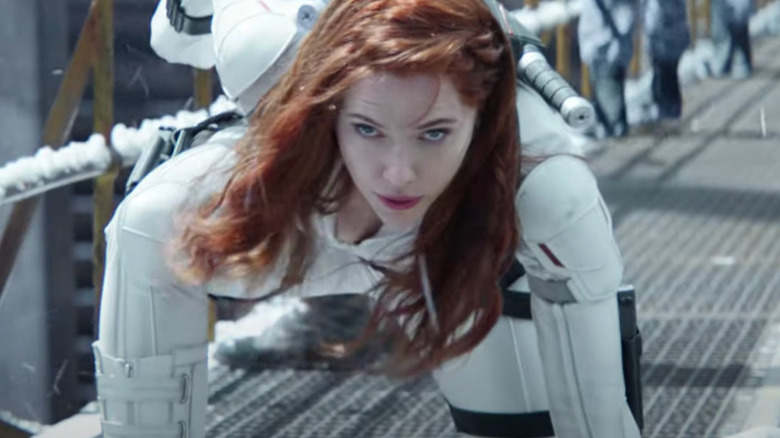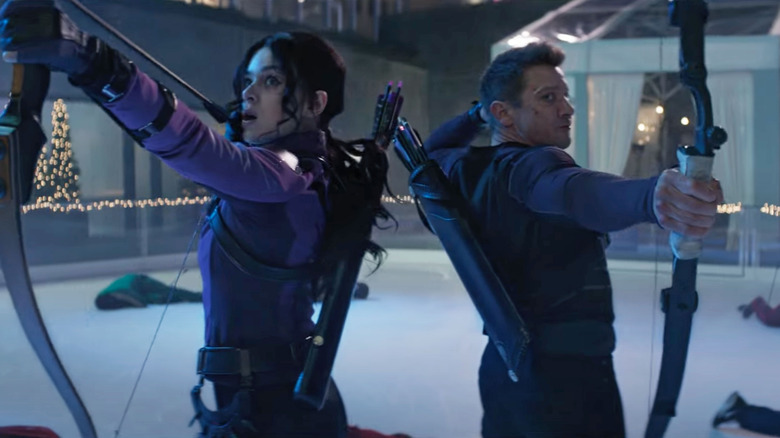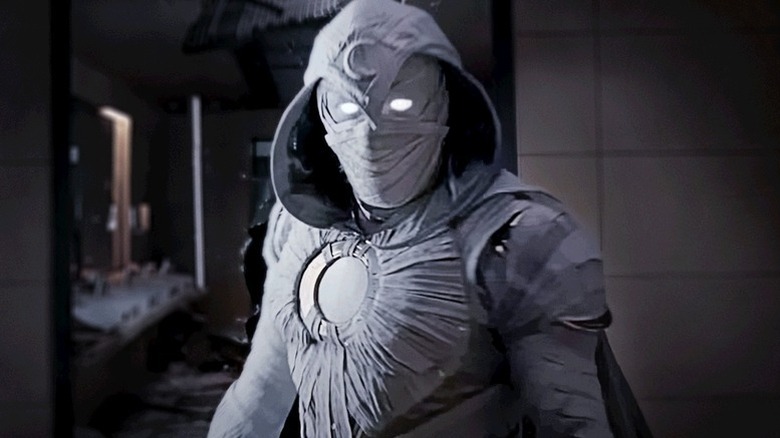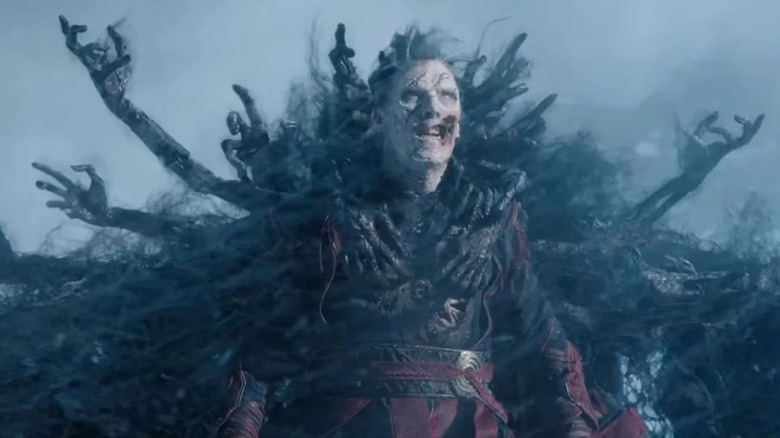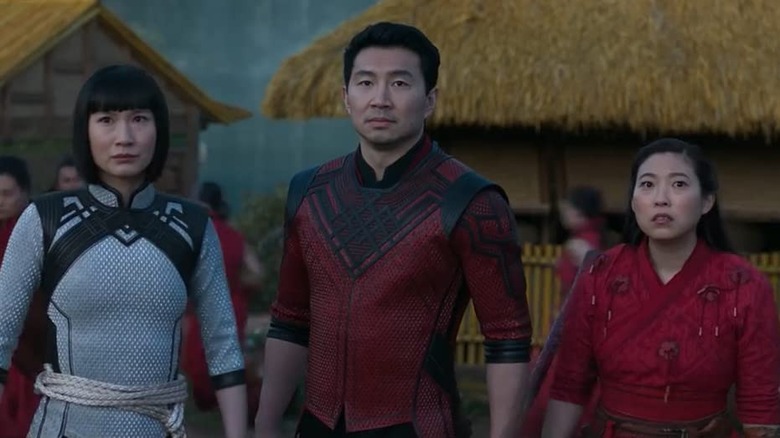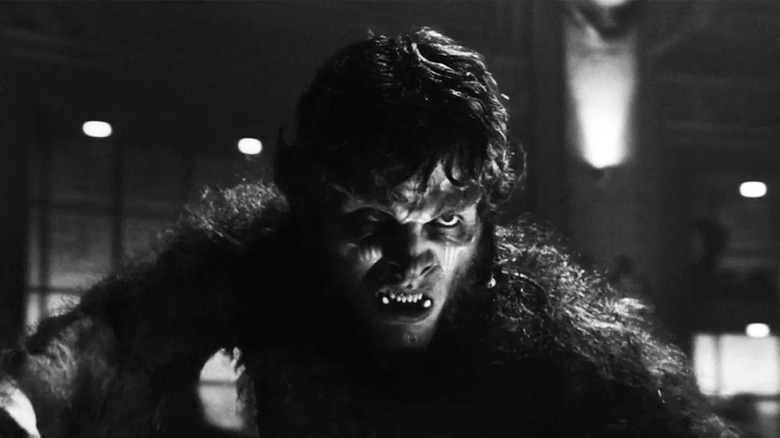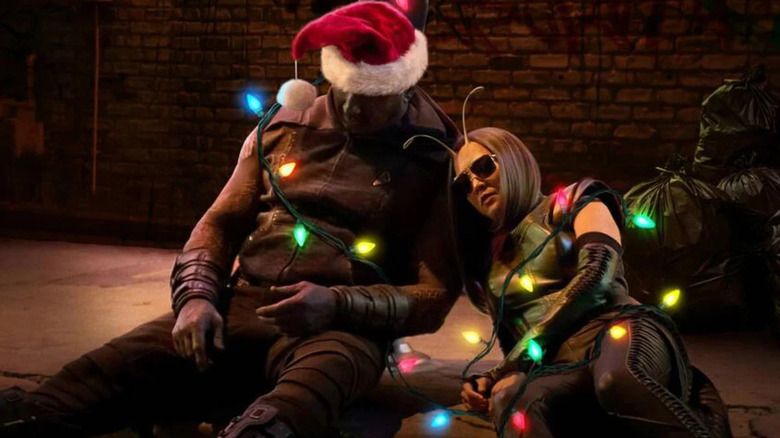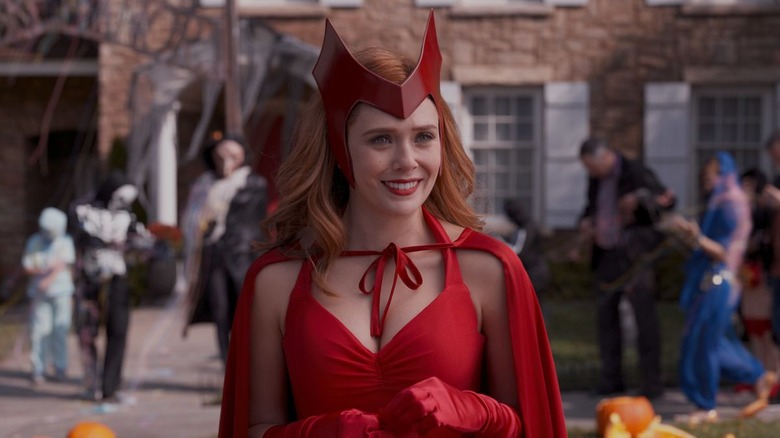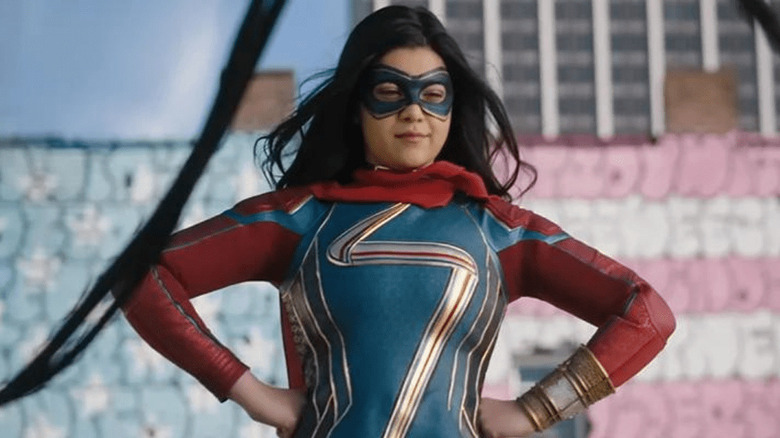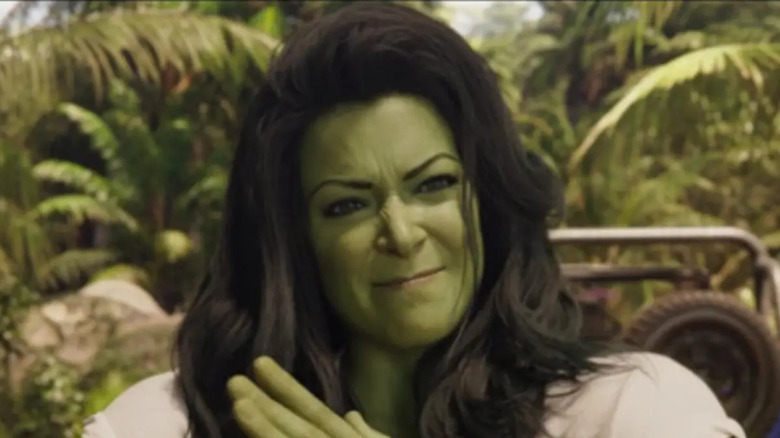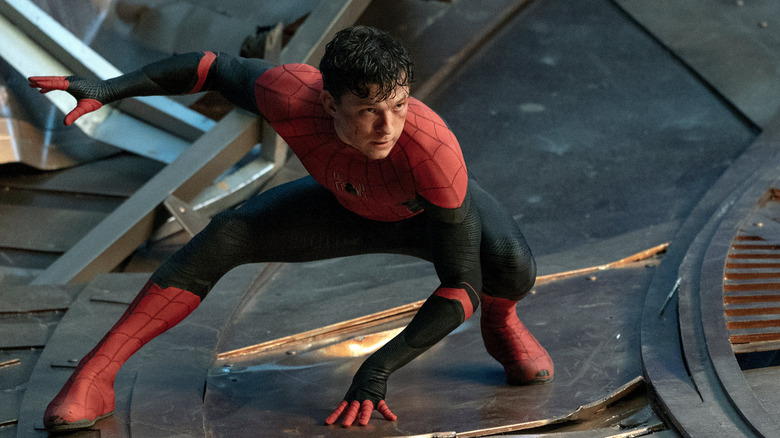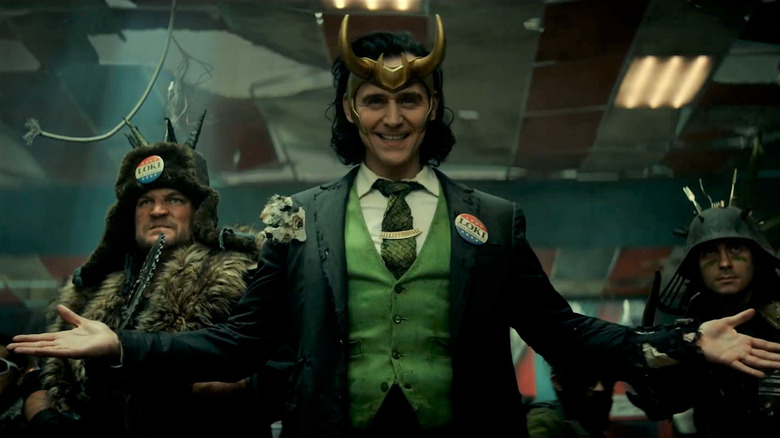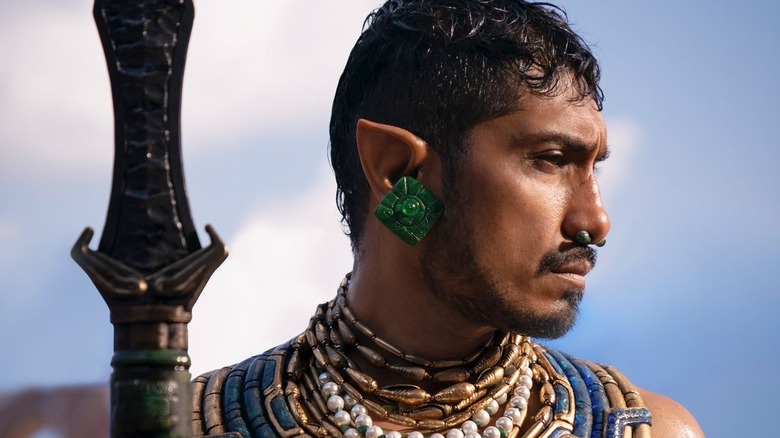Every Movie And Show In Marvel's Phase Four, Ranked
Let's think of Marvel's phases like albums. If Phase One is a game-changing debut album, and Phase Two is the sophomore slump beater, Phase Three makes the MCU pop royalty — it's been at the top of the charts for years. By this point, Marvel feels too big to fail. Then, enter Phase Four.
Phase Four finds the MCU's messy imperialist pop mode. At this stage, it has nothing left to lose, so it throws out all sorts of tones and approaches to see what sticks because it can. That makes it torn between bolder artistic instincts and reliable hit-making. Some moments rip while others land with a thud. Phase Four is like U2's "Pop" or Taylor Swift's "Reputation." As a cohesive record, it doesn't work. But its disparate collection of tracks includes some Hall of Fame ballot efforts and ones that audiences can and will return to again. MCU's latest phase deserves its due and criticism. Here, we explore every Marvel Studios' movie and television show in Phase Four, ranked from worst to best.
Thor: Love and Thunder
"Thor: Love and Thunder" is Taikia Waititi's Icarus moment. The comic dynamo turned A-list director spent the last fifteen years refining his sense of humor only to have it prove commodifiable post-"Thor: Ragnarok." Suddenly, Waititi was everywhere, a planet-sized force in Hollywood's galaxy. In "Thor: Love and Thunder," Waititi flies too close to the sun. The balance of screwball setpieces and pathos-laden drama that got "Jojo Rabbit" award nominations tipped the scales and spilled all over. At every moment, "Thor: Love and Thunder" feels at its mid-breaking point. The center doesn't hold because the story isn't there.
Waititi's disappointing follow-up to one of Phase Three's finest efforts epitomizes everything that went wrong for Marvel during Phase Four. They pushed VFX houses and their artists to the point of physical and emotional collapse, and this strain appeared on camera (via IGN). More often than not, "Thor: Love and Thunder" feels like an unfinished movie. Marvel Studios genuinely yielded more artistic freedom to directors, but that blew up in their faces. Jane's cancer subplot — which looks even glibber and more poorly realized in the shadow of "Wakanda Forever" — is an explosion-sized misfire. Parts of "Thor: Love and Thunder" work. But there's too much talent behind the movie for it all to shrivel up and burn. Hopefully, Thor and Waititi's fall from grace yields a soft landing. They deserve it, just as audiences deserved better than "Thor: Love and Thunder."
The Falcon and The Winter Soldier
"The Falcon and The Winter Soldier" is one of several Marvel projects compromised by the COVID-19 pandemic. Kevin Feige doesn't need me or a pandemic to make excuses for his final product, but I'm curious to know what Malcolm Spellman's original vision would have been. So much of the show works spectacularly — from a genuinely raw look at American racial history and veteran treatment to some killer action set-pieces — but the landing doesn't stick. Character arcs get rushed to lay track for future projects. The Flag Smashers, whose plan and politics were too opaque to feel like social commentary, become clumsy and cringe.
More than any other MCU show on Disney+, "The Falcon and The Winter Soldier" makes the case that sticking to a rote six-episode formula can be damning. There's an ingenious two-hour movie in its bones. There's an even better ten-episode series — one that could have explored Eli's history with more care, given The Flag Smashers' well-articulated motivations, and not let U.S. Agent off the hook. That's not "The Falcon and Winter Soldier" we get. Instead, audiences have a final episode that's big on speech-making and bereft of sense that also wants the audience to get excited about the Power Broker (Emily VanCamp) while Kang's (Jonathan Majors) traverses the multiverse. That's not just a story compromised by COVID — it's a story compromising its heart.
What If...?
"What If...?" contains one of the single best Phase Four television episodes: The outing is so heartbreaking and expertly realized it should be that bar that season 2 needs to vault over. "What If...Doctor Strange Lost His Heart Instead of His Hands?" is a triumph of expressive animation and artistic intent. Its set-pieces couldn't be realized in live-action as effectively. Feige gave A.C. Bradley the green light to get darker than Marvel ever does. (Phase Four contains two projects which are genuine tragedies. This episode is one of them.) Benedict Cumberbatch does more expressive work as a Doctor Strange torn between grief and hubris than he does when facing the Scarlet Witch and Illuminati in Sam Raimi's "Multiverse of Madness."
"What If...?" could be a boon for creative storytelling. Sadly, it's the series' push-and-pull between telling a serialized tale or risky one-offs that make its final product lacking. The show's penultimate and last episode undid the pitch-black ending of "What If...Doctor Strange Lost His Heart Instead of His Hands?" — and the show's overall impact. The MCU had tremendous success with its "Special Presentations" in Phase Four. "What If...?" is almost a whole season's worth of them. If it is in Phase Five or Six, it might be the sneak attack highlight of the whole darn thing.
I Am...Groot
There's a serious chance that the "I Am...Groot" series is some Marvel fans' favorite Phase Four effort. There's also a chance that those fans are children or their parents. In no way is that a backhanded compliment — "I Am...Groot" is aimed at Marvel's youngest viewers, a frequently adorable romp delivered in bite-sized installments. Including it in Phase Four almost feels wrong. The show feels like a treasured, reliably lovely set of short films that would've been a Blu-Ray extra for "Guardians of The Galaxy Vol. 2" — if physical media was more popular.
That's why "I Am...Groot" ranks so low on this list. It has a higher artistic floor than some projects featured here, but it also has a low ceiling. That's by design, to be clear, but it also makes "I Am...Groot" more of an appetizer than a meal. This series can't compete with Phase Four's feasts — not that its target audience would mind that much.
Eternals
More than other Phase Four projects, Chloé Zhao's epic, inconsistent tragedy felt like Marvel shaking up their formula. The Eternals aren't easily digestible characters, as their motives don't fit alongside the MCU's usual focus. Somehow, the Oscar-winning Zhao was making the first Marvel movie that didn't feel like a typical Marvel movie while debuting a group of characters who sat on the sidelines during Thanos' blip feel relatable. Does that sound easy? Does it even seem possible? That makes it feel like a doomed project to start.
I have zero doubt that "Eternals" missed those marks. Zhao's movie feels clumsy and poorly structured. Inexplicably, it merges a "getting the band back together" narrative with an over-reliance on flashbacks, stymying its momentum. There are also storytelling choices that are tonally confusing even if their thematic aims are genuinely fascinating. (See: Brian Tyree Henry's Phastos). Despite its stumbling moments, "Eternals" emerges as one of the most haunting Marvel projects to date.
For all intents and purposes, "Eternals" is a tragedy that doubles as an ecstatic testament to the highs and lows of life. The moral grey area is its comfort zone. The film finds as much empathy for Ikaris (Richard Madden) and his brainwashed loyalty as it does for Kingo (Kumail Nanjiani) and his selfish pacifism. That genuinely means "Eternals" is a Marvel movie unlike any other — even if it's not the refreshing masterpiece hype portended. While seemingly doomed to fail, it's not a failure.
Black Widow
It feels strange to call "Black Widow" the most underrated project of Marvel's Phase Four, but it is by a mile. Cate Shortland's film gets dismissed for its visual effects-heavy third act and aimless story. After Phase Three, the MCU backed itself into a corner. Previously, every movie or show released needed to matter or connect. "Black Widow" isn't an important movie. Not in the slightest. Florence Pugh and David Harbour have more fun playing Russian spies and the Soviet equal of Captain America than should be legally permissible. That rules.
What keeps "Black Widow" from achieving liftoff is its wildly ambitious but visually confusing third act. However, the throughline that leads there is incredibly sound. Shortland's film concerns itself with the severe intersection of nationalistic programming and societal gaslighting. The Black Widows of the Red Room become weapons for their country and Dreykov (Ray Winstone), their sadistic handler, controls them. What is and isn't reality becomes circumspect. That plot point sits side by side with Natasha (Scarlett Johansson) and her "family" parsing through the fiction of their nuclear arrangement. Couple those themes with some slick, above-average action scenes, and "Black Widow" is a film with a lot on its mind and lands some gut punches.
Hawkeye
Every Marvel television show has an episode that feels like the best version of the project and the best of what the MCU television could be. For "Moon Knight," that episode is "Asylum." For "WandaVision," it's "A Very Special Episode." "Hawkeye" isn't as emotionally complex as those two programs, so its best offering involves a majestic tracksuit mafia chase across Brooklyn in "Echoes." For thirty-odd minutes, "Hawkeye" becomes a show with the scope of a blockbuster action movie and the breathing room of serialized television. The episode is shaggy, specific, and precisely channels Matt Fraction and David Aja's seminal comic book.
If only the rest of "Hawkeye" could hit the highs that "Echoes" did. Kate Bishop (Hailee Steinfeld) is an instantly winning addition to the MCU. Her Christmastime misadventures with Clint Barton (Jeremy Renner) are more New York than any MCU project before them. Marvel struggles to make real-world places and ordinary citizens feel lived-in. But it achieves both in "Hawkeye."
Sadly, an unfortunate reliance on surprise big bad guys (welcome back, Kingpin!) and a rushed denouement keep "Hawkeye" from being among Phase Four's best shows. But "Hawkeye" builds a blueprint for better Marvel television, however briefly. That's as commendable as Kate Bishop's killer archery skills.
Moon Knight
"Moon Knight," appropriately, is a tale of two shows. Like Steven Grant (Oscar Isaac) and Marc Spector (Oscar Isaac), Jeremy Spector's head-trippy cape and cowl drama feels torn between its two equally essential personalities. One is a thorough and heart-shattering character study. The other is a run-of-the-mill Disney+ MCU joint. Ultimately, the character study wins out and leaves the most lasting impression. When episodes of "Moon Knight" work, they explore Marc's psyche and traumatic history to unfathomable depths. The one-two punch of "The Tomb" and "Asylum" is some of the best television Marvel has ever produced – veering from the former's excellent Benson and Moorhead-helmed crypt horror to a searing journey through Marc's head. Marvel fans claim MCU performers deserve awards regularly, but Isaac deserves Emmy consideration for his stunning, heartwrenching, and (almost entirely) unflinching depiction of mental illness.
As for the superhero stuff? That's not the show's focus. When it does call attention to the kaiju-like battles between warring Egyptian gods or Arthur Harrow (Ethan Hawke) and his attempt to purge the world of future crimes, the show feels pedestrian. "Moon Knight" wants to have its cake and eat it too: It wants to strike a balance between action adventure and psychological drama. While it comes close enough to warrant middle-of-the-pack placement on this list, it's not close enough to be the best of Phase Four.
Doctor Strange in The Multiverse of Madness
Sam Raimi is known for his signature stylistic excesses. He's a great storyteller who favors massive dolly zooms and cartoonish violence over subtlety. Nothing about him trends toward the mean average. Marvel movies are the mean, the x and y axis other blockbusters pivot around. Fans were worried "Doctor Strange in The Multiverse of Madness" wouldn't feel like a Sam Raimi movie — but whatever problems "Multiverse of Madness" has, "feeling like a Sam Raimi movie" isn't one of them.
In the MCU film, Doctor Strange (Benedict Cumberbatch) battles an eviler version of himself. Wanda (Elizabeth Olsen) rips Professor X's (Patrick Stewart) head in two. During the film's climax, Doctor Strange possesses a reanimated Doctor Strange (don't ask), sprouts multiple arms, and gravely intones the phrase "America." It's still hysterically funny, and Raimi knows it. Though the second act of "Multiverse of Madness" is unusually flat and expository by the director's standards, it's a picture crafted to his tastes — including the "villainy" of Wanda Maximoff.
Many were upset at the heel turn Scarlet Witch takes in "Multiverse of Madness." I understand their frustration and argue the switch still cements her standing as a top-tier MCU character. Wanda is closer to Doc Ock from Sam Raimi's "Spider-Man 2" than MCU's mediocre bad guys — a good person whose darkness is unlocked through experimentation and turns into a horror monster. Doc Ock is one of the all-time great on-screen villains. Wanda might be too.
Shang-Chi and The Legend of The Ten Rings
The lede for "Shang-Chi and The Legend of The Ten Rings" is "Marvel's best action scenes." That's only half-accurate. Yes, the fight choreography in Destin Daniel Cretton's expansive comic-book film is a step up from average MCU offerings, with loving attention to the detailed way fists fly. But "Shang-Chi" finds Marvel following — not setting the bar for — top-tier action cinema. As great as the bus fight was, it can't compare to the bus fight in "Nobody," nor can the film's climatic battle reach the ecstatic heights of Yi-Mou Zhang.
It isn't meant to. Not really. The great set-pieces of "Shang-Chi" feel like gateways to harder-hitting films. At its core, "Shang-Chi" is a love letter to Hong Kong action cinema that doubles as a treatise on nature versus nurture. Cretton could have reinvented the wheel, but he would have done so at expense of the legitimately dark and moving relationship between Shang-Chi (Simu Liu) and Xu Wenwu (Tony Leung Chiu-wai).
Rather than bog his movie down in comic book mythology, Cretton moves his third-act climax to Ta Lao and pits mythical creatures against the Ten Rings' army of tech-adorned soldiers. This is a gorgeous lane for Marvel movies to occupy. "Shang-Chi" is hyper-personal and a broadly sweeping entry point to an entire family tree film. The film never wastes its audience's time or gets hung up on its Marvel responsibilities. In other words, it's very freaking good.
Werewolf By Night
More than any other Phase Four MCU project, "Werewolf By Night" feels like a stand-alone entry. If you'd never seen an "Iron Man" film or lived under a rock and avoided "The Avengers," Michael Giacchino's gothic horror riff would still be enjoyable. It feels like the product of an artist raised on Hammer horror movies and vintage Twilight Zone classics. "Werewolf By Night" is a gorgeous black-and-white yarn that rarely dips into comic-book tropes. Some will call "Werewolf By Night" the antidote to Marvel doldrums: I'd name it the path Phase Five should sprint down.
"Werewolf By Night" leaves audiences wanting more. It doesn't exhaust viewers by giving them a three-hour story. What's more, it's unlike almost anything else on television. (The closest progenitor of "Werewolf By Night," of all things, might be Netflix's "Wednesday.") Giacchino's been one of film's finest composers — look to "Spider-Man" themes for proof — but he brings the same emotional sweep and idiosyncracies to "Werewolf By Night" that he does to his music. Even when you can see the cues it's picking up from, it's a unique symphony of grin-inducing action horror.
The Guardians of The Galaxy Holiday Special
"The Guardians of The Galaxy Holiday Special" is the calm before the storm. James Gunn described writing "Guardians of The Galaxy Vol. 3" as "torture," as it's his farewell to these characters. Accordingly, the "Holiday Special" is a celebratory, 40-minute act of wish fulfillment. It posits that the miracle of Christmas is gift-giving and then precedes to give audiences one gift after another — from Kevin Bacon playing himself to original songs composed by alt-country stalwarts Old 97's. There's nothing about Gunn's special that isn't generous. That it sustains its generosity from frame one while finding time for subversive action and rotoscope animation only makes it all the more miraculous.
That's why the "Guardians" special ranks so high up this list. The Marvel Special Presentations proved that one-off episodes can be the equivalent of one-shot comic books — not essential to continuity stories that work on their own, wonderful terms. That's what the "Guardians of The Galaxy Holiday Special" does. No matter what happens in "Guardians of The Galaxy Vol. 3," it will work as a stand-alone tone poem to the vulnerable act of trying to make someone happy. It's the spirit of Christmas with an even better soundtrack.
WandaVision
It's difficult to separate the quality of "WandaVision" from the cultural experience of watching "WandaVision." The latter is almost unparalleled. Ten months into the COVID-19 pandemic, the MCU dropped its first Phase Four offering, and it was a puzzle box show that felt genuinely different. The internet exploded. Every week yielded a rush of theories, memes, and remixes of "Agatha All Along." "WandaVision" was an event bereft of the understandable cynicism that greets new MCU projects. There may never be anything else like it again.
Although the cultural experience of watching "WandaVision" was amazing, the show is more of a mixed bag. Its first six episodes are as strong as anything Marvel has ever produced. Writer Jac Shaffer and director Matt Shankman expertly integrate television sitcom structure and cliches into a devastating mystery. By the time "A Very Special Episode" hits and Vision is screaming at Wanda while the credits roll, the show's achieved seriously smart storytelling language.
Sadly, it all but abandons that in its final episode. The end of "WandaVision" is genuinely heartbreaking, but it also fails to wrestle with what Wanda did to the town of Westview in a meaningful way. It leaves far more questions hanging than it ought to for a finale. However, none of those disappointments will change the cultural experience of "WandaVision" or dull the season's front half. It does mean that, much like Wanda's hex, the power of "WandaVision" can only go so far.
Ms. Marvel
Marvel Studios' movies and television series incorporate varying sub-genres into their superhero stories. Although "Captain America: The Winter Soldier" is not a conspiracy thriller, no matter what the Russo Brothers claim. That film is a cape and cowl movie that traffics in conspiracy thriller cliches — though it freshens them up successfully. That inconvenient truth is at the heart of the "Scorsese versus Marvel" debate. More often than not, the MCU is an effective set of rollercoasters. Yes, rollercoasters have variance. But ultimately, they're rollercoasters.
However, "Ms. Marvel" is not a rollercoaster. The genuine triumph of Bisha K. Ali's Disney+ show is how it's a coming-of-age tale first and a superhero story second. Kamala Kahn's (Iman Vellani) origin story becomes intrinsically tied to her heritage — specifically India's Partition, the 1947 event that separated India and Pakistan through intense violence. To become a hero, Kamala needs to learn her history, as she lives in Jersey City in her Muslim community. That history is thrillingly realized on screen, making "Ms. Marvel" unlike anything the MCU has done.
With more ease than most MCU properties, "Ms. Marvel" builds Kamala's community with grace and specificity. Her high school feels real. The squad of aunties is as vivid as her powers. Community gives Kamala a reason to grow as a person first and a hero second. "Ms. Marvel" is one of Phase Four's best offerings.
She-Hulk
"Six seasons and a movie" is the prophecy Dan Harmon's "Community" realized — an inadvertent new shorthand for a TV comedy that's thrilling. I think this applies to "She-Hulk" wonderfully.
"She-Hulk" is the first and only Disney+ Marvel show that genuinely feels like classic television. Even with its fourth-wall-shattering finale, the show feels like it could run on-air for years. Jessica Gao's fun lawyer show revels in Marvel Comics' absurdly deep character well to fuel its classic, case-of-the-week format. The series brings characters like Mr. Invincible (David Pasquesi) and Man-Bull (Nathan Hurd) to life with relish, making the MCU feel less precious. Feige did a remarkable job of turning every show or character that enters the MCU into an event, but it's poisoned the well and made Marvel feel exhausted. "She-Hulk" is the antidote. While it's not stakes-free television, its stakes are easier to sustain week in and week out than tuning in again the fate of the world. Also, the show's incredibly funny. (Look to Madisynn (Patty Guggenheim) and the way she took Twitter by storm for proof!)
The MCU series is a story about how difficult it is for women to tell their stories. They have to fight corporate culture, the patriarchy, and even K.E.V.I.N. Feige to do so. "She-Hulk" follows Jessica Walters (Tatiana Maslany) with all the joy, wit, and care the character deserves. It's a meaningful but still fun lawyer show. Here's hoping it gets six seasons!
Spider-Man: No Way Home
The MCU's Phase Four was more artistically successful than its previous films — although that's not the filmmakers' fault. In Phase Four, Feige and Marvel Studios' creative teams had to ask themselves what a Marvel movie should be and feel like when there are shows and special presentations to contend with in the universe. The best answers to that question are "Black Panther: Wakanda Forever" and "Spider-Man: No Way Home."
Jon Watts' cultural sensation is all but "Fan Service: The Movie," a massive act of internet wish fulfillment that's thematically sound. The film spotlights the MCU's Peter Parker (Tom Holland) while honoring Tobey Maguire's Peter and improving Andrew Garfield's Peter. Fascinatingly, it's a film about loss and redemption that refuses to let old characters die. While this sounds counter-intuitive, it isn't. Instead, Watts and his team give audiences the gift of seeing two decades' worth of beloved characters grace the silver screen — the medium audiences met them through — for a story where sacrifice is permanent. The presence of prior Peter characters adds weight to the latest Peter's decision to have others forget him. The fan service here is essential to its themes.
"Spider-Man: No Way Home" is beloved because Watts gives fans what they want in the guise of a popcorn film that feels like a magic trick — a fine new Marvel standard.
Loki
"Loki" is not just the best show of the MCU's Phase Four. Arguably, it's Marvel Studios' best creation. I'm tempted to rank it and "Wakanda Forever" 1B and 1A, respectively, because it's just that excellent. Transcending Marvel trappings, "Loki" is a fantastic tale about reevaluating life's purpose. The Disney+ show puts the villainous Loki on an archetypal hero's journey. But no matter how much Loki (Tom Hiddleston) grows, his fate can't change. The vengeance Sylvie (Sophia Di Martino) craves never satiates her. The TVA? Well, that's a lie. Everyone's glorious purpose is an illusion.
In the end, the characters keep going. That's what "Loki" builds to — a shot of Loki, heartbroken and picking himself back up again. Deciding to take the rougher and more humane path (a likely dead end) is heroism. Regardless of the outcome, that's a glorious aim in a beautiful and modern tale that doesn't feel beholden to comic-book trappings.
The impeccable writing and direction of Michael Waldron and Kate Herron bring this series to life alongside Natalie Holt's iconic score and next-level performances. Hiddleston transforms Loki over six sterling hours, while Richard E. Grant and Jonathan Majors all but steal the show. There's a serious chance the events of "Loki" form the bedrock of Phases Five and Six. If they can build on its quality, audiences would be incredibly lucky.
Black Panther: Wakanda Forever
"Black Panther: Wakanda Forever" was never envisioned to exist as it is now. No one at Marvel Studios — nor fans — were anticipating the untimely loss of Chadwick Boseman to cancer at age 43. Ryan Coogler didn't have to make "Wakanda Forever." The film could have been a celebration of Black joy or a feature about mourning or a run-of-the-mill comic-book movie. If it had been only moderately successful, the world would have understood. Instead, "Wakanda Forever" is a miraculous film about mourning that celebrates Black joy and is one of the year's best movies.
What makes "Wakanda Forever" feel so radical is its tacit acknowledgment that nothing gold can stay. Loved ones eventually die. Superhero movies, however popular they are now, will become passé. For the first in a Marvel movie, there's a sense of urgency. The story moves quickly lest another tragedy occurs. However, it still stops to celebrate the simple joys of community or have fun with Okoye (Danai Gurira) and her terrible makeup job. It gives us the promise of the future in RiRi Williams (Dominique Thorne) while acknowledging the past still hurts and haunts the film's characters. There is nothing easy about "Wakanda Forever," but it works as an action film and a hyper-personal blockbuster. "Wakanda Forever" is cinema.
